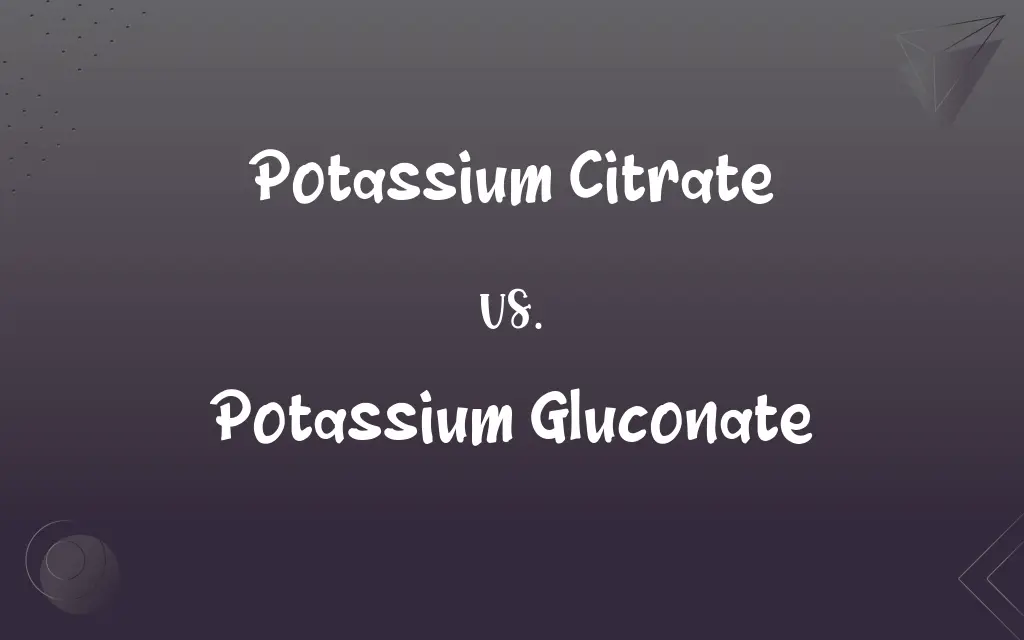Potassium Citrate vs. Potassium Gluconate: What's the Difference?
Edited by Aimie Carlson || By Harlon Moss || Published on December 2, 2023
Potassium citrate is a citric acid salt, used in medicine and food; potassium gluconate, a gluconic acid salt, is used for potassium supplementation.

Key Differences
Potassium citrate, a compound formed from potassium and citric acid, is commonly used for treating kidney stones. Potassium gluconate, on the other hand, is derived from gluconic acid and is primarily used as a potassium supplement in cases of deficiency.
In terms of chemical structure, potassium citrate is comprised of potassium ions and citrate, a tricarboxylic acid. Potassium gluconate contains potassium ions and gluconate, a molecule derived from glucose.
Potassium citrate has an alkalizing effect on urine, which helps in reducing kidney stone formation. Potassium gluconate's role is primarily to maintain potassium levels in the body, without specific effects on urine pH.
The medical uses of potassium citrate extend to managing conditions like cystinuria and uric acid kidney stones, while potassium gluconate is used for preventing or treating low blood potassium levels.
Potassium citrate is often found in food as a preservative or pH stabilizing agent, whereas potassium gluconate is more common in dietary supplements for potassium enrichment.
ADVERTISEMENT
Comparison Chart
Chemical Composition
Salt of citric acid
Salt of gluconic acid
Primary Use
Treating kidney stones, food additive
Potassium supplementation
Effect on Urine
Alkalizes urine
No specific effect
Medical Applications
Kidney stone prevention, cystinuria
Potassium deficiency treatment
Common Forms
Preservatives in food, medication
Dietary supplements
ADVERTISEMENT
Potassium Citrate and Potassium Gluconate Definitions
Potassium Citrate
A salt derived from potassium and citric acid.
Potassium citrate is often prescribed to prevent kidney stones.
Potassium Gluconate
A gluconate salt beneficial for electrolyte balance.
To maintain his electrolyte balance, he uses potassium gluconate.
Potassium Citrate
Used in medicine to alkalize urine.
The doctor recommended potassium citrate to manage her urinary pH.
Potassium Gluconate
Often used in nutritional products.
This health drink is fortified with potassium gluconate.
Potassium Citrate
A food additive for pH control.
Potassium citrate is listed as an ingredient in this canned fruit.
Potassium Gluconate
Found in over-the-counter dietary supplements.
You can buy potassium gluconate at any pharmacy.
Potassium Citrate
A compound that helps prevent certain types of kidney stones.
His cystinuria is managed with a daily dose of potassium citrate.
Potassium Gluconate
Used to treat or prevent potassium deficiency.
Her diet lacks potassium, so she takes potassium gluconate.
Potassium Citrate
A preservative in various food products.
Potassium citrate extends the shelf life of this beverage.
Potassium Gluconate
A salt formed from potassium and gluconic acid.
Potassium gluconate supplements can help raise potassium levels.
FAQs
Can potassium citrate affect urine pH?
Yes, potassium citrate alkalizes urine, which helps prevent certain types of kidney stones.
Is potassium citrate safe for everyone?
It should be used under medical supervision, especially in people with kidney issues or on certain medications.
Can potassium gluconate be used for kidney stones?
It is not typically used for kidney stones; its main use is for potassium supplementation.
Is potassium citrate found in natural foods?
Potassium citrate is not naturally occurring in foods but is added as a supplement or preservative.
Can I take potassium gluconate if I have kidney problems?
Caution is advised and it should be taken under medical supervision if you have kidney issues.
What is potassium citrate used for?
Potassium citrate is used to prevent and treat kidney stones, and as a food preservative.
Can I take potassium gluconate for high blood pressure?
While it can help with potassium levels, it's best to consult a doctor for high blood pressure treatment.
Can children take potassium citrate?
It should be given to children only under medical advice.
How is potassium gluconate different from potassium citrate?
Potassium gluconate is mainly used for potassium supplementation, while potassium citrate is used for treating kidney stones and as a food additive.
Are there any side effects of potassium citrate?
Side effects can include gastrointestinal discomfort, nausea, and diarrhea.
Is potassium gluconate found in food?
It's not commonly used in foods but is found in dietary supplements.
Can I take potassium citrate with other medications?
It may interact with certain medications, so consult a healthcare provider.
Does potassium gluconate help with muscle cramps?
It can help if cramps are due to potassium deficiency.
What is the recommended dosage for potassium gluconate?
The dosage varies based on individual needs and should be determined by a healthcare provider.
How long does it take for potassium citrate to work?
The effects on kidney stones can take several weeks to months.
Can I overdose on potassium gluconate?
Overdose is possible and can be dangerous; it's important to adhere to the prescribed dosage.
Is potassium citrate suitable for pregnant women?
It should be used during pregnancy only if clearly needed and under medical advice.
Are potassium citrate and potassium gluconate the same?
No, they are different compounds with different uses and effects.
Is potassium gluconate vegan?
Most potassium gluconate supplements are vegan, but it's best to check the product label.
Is potassium gluconate effective immediately?
It starts to work soon after ingestion, but visible effects on potassium levels may take time.
About Author
Written by
Harlon MossHarlon is a seasoned quality moderator and accomplished content writer for Difference Wiki. An alumnus of the prestigious University of California, he earned his degree in Computer Science. Leveraging his academic background, Harlon brings a meticulous and informed perspective to his work, ensuring content accuracy and excellence.
Edited by
Aimie CarlsonAimie Carlson, holding a master's degree in English literature, is a fervent English language enthusiast. She lends her writing talents to Difference Wiki, a prominent website that specializes in comparisons, offering readers insightful analyses that both captivate and inform.






































































